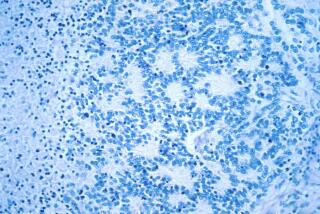HIV Curbed by Using Cells Made From Patients
- Share via
For the first time, researchers have suppressed HIV in infected patients by giving them injections of cells made from their own immune systems.
Thanks to the latest drugs, many patients show little sign of HIV infection in their blood but carry lingering traces of the AIDS virus in lymph nodes and other hard-to-reach places. The new approach could point to new paths for destroying such remnants of the virus, scientists say.
Though they say the new technique can’t be used immediately to treat large numbers of patients, it is encouraging because it appears to curb the virus temporarily in lymph nodes.
“An area we want to consider is: Is it possible to rid somebody of infection?” said the study’s chief author, virologist Scott Brodie at the University of Washington.
The research will be published today in the January issue of the monthly journal Nature Medicine.
HIV propagates by attacking a kind of immune cell known as a helper T-cell. The researchers chose three patients and isolated from their bodies another type of white blood cell, known as a killer T-cell, which destroys HIV.
By cloning and other means, they grew huge numbers of each patient’s killer T-cells in a laboratory and genetically engineered some with markers to trace their movement within the body. They then injected massive amounts back into each patient and traced the migrating cells to lymph nodes.
There, the new killer T-cells knocked down the number of infected helper T-cells, in some cases to undetectable levels, according to the researchers. The effect was temporary, though, as the new cells disappeared within three weeks.
Still, Dr. Roger Pomerantz, chief of infectious diseases at Jefferson Medical College in Philadelphia, who is familiar with the research, called it an exciting early step toward eradicating HIV “where it hides.”
Another AIDS study appearing today in Nature Medicine points to a second approach in replenishing the immune system.
Researchers found that an HIV infection shortens the life span of both killer and helper T-cells to less than a third of normal, and production of replacement cells lags behind.
Many researchers have theorized that HIV irreparably breaks down the body’s cell-replacement capacity through overuse.






